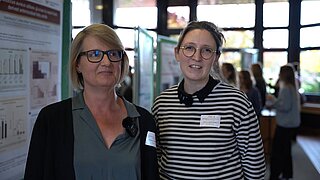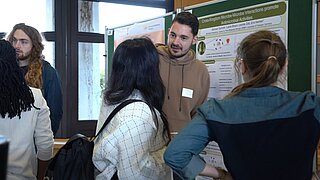Early Career
Early career researchers (Postdocs and Junior Group Leaders) affiliated with the Cluster of Excellence CMFI receive mentoring as well as financial and structural support. Furthermore, the CMFI supports the coordination of the M.Sc. program Microbiology and the Graduate School of Infection Biology and Microbiology (IGIM). Doctoral students at the University of Tübingen from the Faculty of Science and the Faculty of Medicine who are member of the IGIM benefit in all aspects of their doctoral studies. The CMFI supports soft skill courses, Grad School Days, Methods and Techniques Days, Career Days and the IGIM Summer School.
About the IGIM
The Interfaculty Graduate School of Infection Biology and Microbiology (IGIM) was founded in 2012 to establish an innovative and highly attractive
educational program for graduate students in medicine, biological and natural sciences.The IGIM is affiliated with Cluster of Excellence CMFI and the German Center of Infection Research (DZIF).
The IGIM offers to PhD students:
- Comprehensive, multi-disciplinary and structured education
- Qualified mentoring
- Support of early independence
- Measures for the integration of foreign students
- Gender equality in science
- Research quality assurance
Complementary skill courses and seminars, networking, events (Grad School Day, Summer School, Methods and Techniques Days, Career Days, excursion), supervision, mentoring.
Successful participants receive a certificate and a transcript of records of all the activities they have participated during the doctorate.
How to become a member?
The IGIM is open to graduate students in the field of infection biology and microbiology who will obtain a doctoral degree at the Faculty of Science (Dr. rer. nat.) or the Faculty of Medicine (Dr. med., Dr. sc. hum., PhD) of the University of Tübingen.
For more information, please contact the IGIM office: tuebingen.igim@med.uni-tuebingen.de.


Junior Office
The Junior Office organizes complementary skill courses and seminars for early career researchers. Doctoral students, postdocs and Junior Research Group Leaders can visit those courses. They range from “Job application” and “Poster presentation” over “Scientific Visualizations” to “Scientific writing tips.”
The Junior Office has already announced the Young Investigator's Grant for doctoral students and postdocs three times and, after a transparent selection process, awarded a total of 286 k€ as grants to a total of nine doctoral students and nineteen postdocs. The early career researchers can use this funding to carry out their own scientific project.
Furthermore, a clinical leave stipend for a MD financing 50% of the position for one year together with 10 k€ for consumables to allow a reduced burden of clinical tasks and permit scientific development of the candidate was approved.
The Junior Research Group Leaders of the CMFI meet regularly in the Junior Faculty, whose spokesperson is represented in the extended Extended Board of the CMFI. In addition to that, a mentoring program was initiated.
With the Junior Office, the CMFI has created a structure that enables the focused promotion of its young scientists.
Prof. Samuel Wagner, PhD

University of Tübingen
Interfaculty Institute of Microbiology and Infection Medicine Tübingen
Cellular and Molecular Microbiology
samuel.wagner@med.uni-tuebingen.de
Website







